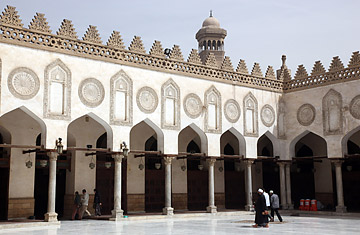
Muslim men visit al-Azhar Mosque in Cairo on March 10, 2010
The erstwhile spokesman of al-Azhar, the Sunni Muslim seminary that serves as Egypt's highest religious authority, sees unfortunate parallels between his institution's experience and that of the clergy during the French Revolution. In short: both took the wrong side.
"Al-Azhar is the most prestigious institution in the Muslim World. It has great credibility as a bastion of Islamic knowledge and tradition," says Mohamed Rifaah, the vast institution's former spokesman. But its image withered under the 30-year regime of now deposed President Hosni Mubarak, who kept the institution on a tight leash. Mubarak exercised the right of his office to appoint the grand sheik of al-Azhar, and the regime controlled the institution's religious message. "This is what made it lose its credibility," says Rifaah. "If you want to be credible, you have to present yourself independently."
As al-Azhar continued to serve its political master by offering scholarly Islamic interpretations opposed to the democratic uprising, Rifaah resigned along with a number of other officials who joined the revolution in their trademark gray overcoats and red caps. Now, the former diplomat believes that Egypt's new political reality offers al-Azhar the chance to reclaim its former international and domestic stature as an Islamic authority by establishing its independence from the regime.
But like all the state institutions under the Mubarak regime's control, al-Azhar's immediate future remains uncertain. And its fate may be part of a larger debate over the place of religion in Egypt's future. That debate includes the role that the country's largest opposition group, the Muslim Brotherhood, will play in Egyptian democracy once it implements its recent decision to create a political party. And there's also the question of how a more democratic Egypt will deal with the Brotherhood's violent archnemesis, al-Qaeda, and related extremist groups. Even more basic, Egyptians are asking whether Article II of the constitution, which declares Islam the religion of the state and Islamic law the principal source of legislation, needs to be amended. The sheik of al-Azhar has warned that any changes to Article II would lead to conflict. Others, like prominent human-rights lawyer Ahmed Seif, say it's simply too soon to be having the debate about religion's role. Elections need to come first, he says. Many others say the conversation has started, and there is no turning back.
Mazen Mostafa, a member of Mubarak's ruling National Democratic Party who joined the revolution early on, believes Egyptians are on the cusp of a fundamentally different religious reality. "I think al-Azhar will lose its stature after some time as Egypt turns to more of a secular role. Both Islam and Christianity will diminish," he says.
Others are less certain. Last Friday, a crowd estimated by some to number over 1 million poured into Tahrir Square to celebrate their revolution and maintain its momentum. One of the keynote speeches was a passionate sermon by Islamic scholar sheik Youssef al-Qaradawi, newly returned from exile, who led the midday prayers. Some see al-Qaradawi's return as a sign that Egypt's revolution will open the way for a more Islamist politics. The popular scholar has a large following and a top-ranked al-Jazeera TV show, but he has been criticized by Egypt's Western allies for rationalizing Palestinian terror attacks. Al-Qaradawi supporters, however, insist he is hardly an extremist; the scholar condemned the attacks on Sept. 11, and is consistently at odds with al-Qaeda, having close ties to the Muslim Brotherhood and its more moderate views on Islam.
